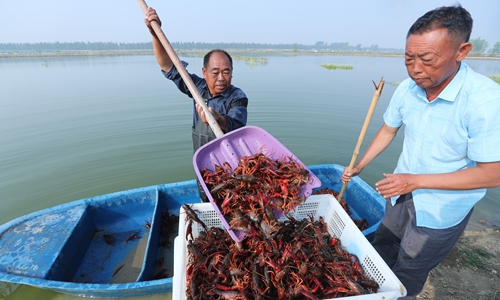HOME >> SOURCE
Global crawfish industry hit in Hubei, epicenter of outbreak
By Yin Yeping and Ma Jingjing Source:Global Times Published: 2020/2/27 20:23:05

Crawfish of Hubei accounts for one-third of the world's crawfish demand. Photo: cnsphoto
Hubei Province, the largest supplier of crawfish in the world, has suspended the business amid the coronavirus outbreak, bringing great uncertainty to the aquatic industry both at home and abroad.However, industry insiders believe that driven by huge market demand, production can soon recover after factories and transportation services resume.
Aquatic product exports are affected because the processing plant in the province cannot work normally, Cui He, president of the China Aquatic Products Processing and Marketing Alliance, said Thursday.
"The slow resumption of production in this aquatic sector will cause more problems, as it hires many workers and offer job opportunities," Cui said.
Cui noted that now is not the peak season for crawfish production, and the current losses could be made up by increasing capacity in April to June.
Hubei is the country's largest freshwater fish production province, which includes crawfish. Cui said that crawfish of Hubei accounts for one-third of the world's crawfish demand. Although the total annual production of crawfish is 1.7 million tons, with the export standing at 20,000 tons, there is an increasing trend overseas.
Li Ke, a manager with a local aquatic processing company, is one of many that are doing both domestic and international business involving aquatic products, mainly crawfish.
"Seasoned crawfish products have become popular in China in recent years, while the foreign market remains relatively small but will pick up," he said, adding that the main buyers abroad are restaurants and supermarkets.
Li's company handles crawfish and seasoned aquatic products and exports them to countries including the US, UK, and Australia. However, affected by the outbreak, many countries refuse to allow Chinese people to enter the country, so shipments are affected, Li said.
Liu Qiangming, an owner of a local aquatic farm in Qianjiang, Hubei Province, told the Global Times that road closures are still the biggest problem harming his business.
"Goods were supposed to be sold by now, but because of the outbreak, the warehouse is full of processed shrimp that can't be shipped out," he said.
In addition, the transport problem has troubled him when it comes to feeding small crawfish in the farm.
"At present, we have 10,000 mu (666 hectares) of land and a total of 1.5 million kilograms of crawfish and as the roads to villages have been blocked, the feed cannot be sent there," he said, adding that the remaining feed can only last till early March.
As one of the mature crawfish producers, Liu is also into the overseas business. Although he just gained the qualification for exports last year, his business has now drawn growing interest from abroad with orders from clients in Asian countries such as Cambodia, Thailand, Singapore, Malaysia and South Korea.
However, due to the outbreak of the disease, orders have been cancelled. "We were classified as an epidemic area, so they stopped our supplies," he said.
According to a report by the Fisheries Bureau of Hubei Province on December 30, 2019, the crawfish industry output value in the province has exceeded 100 billion yuan, and its production, processing and export volume of crawfish have ranked first in China for 12 consecutive years. The Hubei crawfish sector accounted for over 60 percent of the European market, with annual export earnings over $150 million.
A crawfish farmer named Hu Junhua in Qianjiang, Hubei Province, told the Global Times that the local government has started offering support to the sector in the region.
As the central government has ordered that nothing should impact spring farming, crawfish farmers are being granted special passes. Hu said he is hoping to get the pass in several days when he is expected to resume sending mature crawfish for sale.
"Our feed supplier has been granted a special pass to deliver animal feed, but as roads in villages have been blocked, the feed cannot be delivered quickly," Hu said
Meanwhile, since almost every household keeps its doors closed and only one family member can go out to farm, there are delays in farm work.
"If the lockdown remains after March 20, crawfish will run wild in the county in May," Hu said.
In order to ensure the production and transportation of crawfish and other aquatic products, the crawfish trading center in Qianjiang partly resumed work on Tuesday to help farmers haul crawfish to all parts of the country, according to a report by People's Daily online.
Posted in: INDUSTRIES,MARKETS